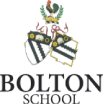
There was a buzz of excitement in the Girls’ Division Great Hall as the audience gathered to hear from Tomasz Schafernaker, BBC weather presenter and meteorologist. This was the latest in a series of free, public Evening Enrichment Lectures hosted by the Girls’ Division. In addition to pupils and their families and Bolton School staff, two external school groups attended the occasion, as well as many guests from the local community.
Tomasz began by talking about how he first became interested in meteorology through his love of aliens and monsters. At the age of eight or nine, he watched a TV programme about a ‘cyclops’ that was about to rip apart Darwin in Australia. The programme was actually about Cyclone Tracy, and though he was disappointed to discover there was no traditional monster, the images of Darwin being hit by the cyclone fascinated him, particularly because in the mind of a child it seemed to have come out of thin air.
His interest in science grew and over the course of his school career he became determined to study meteorology. He talked about how he realised that being a research scientist wasn’t quite right for him, as he wanted to connect with people and talk about meteorology, and instead took the opportunity to become a Broadcast Assistant at the BBC Weather Centre. However, he had no idea at the time that this would lead to presenting the weather live on regional television at the age of just twenty-one! He talked about the great responsibility of representing two big establishments, the Met Office and the BBC. He went on from this to train as a weather forecaster, and said, “I couldn’t believe I was predicting at 9am that a cloud would form at 11am, and then it happened!”
Tomasz discussed some of his recent projects, including filming in the Rocky Mountains where he met a research team working on snow and cloud seeding. He described the experience as “like watching science fiction in action” and said, “That was in March, so even now meteorology still surprises me.”
In addition, he was able to talk in detail about his trip to Florida during Hurricane Irma in September, which he said was the most extreme weather he had experienced. He was struck by the way it affected people: it changed their lives not just for a couple of days around the storm, but for a week or two, and nothing in the UK’s weather is on the same scale. He described watching the hurricane arrive from his hotel and said that rather than ‘hitting’ in the way that is so often described, the hurricane builds, getting bigger and bigger and often catching people out.
He went on to talk about the difference between meteorology, the study of long-term weather patterns and climate change, and weather forecasting, which is concerned with predicting the weather over the coming hours or days. He was able to shed a little light on how weather forecasters use their “Harry Potter book of spells”, computer models and AI, along with experience and knowledge, to predict what the weather will be doing in the future. He also revealed that all weather presenters receive their information from just one weather forecaster, who uses a huge number of different computer models to predict the weather for the whole of the UK!
He went on to explain that weather presenters translate that information into something that the public can understand.
Tomasz said that often the impression of the weather’s impact is the most important part of the weather report. He described an example where he got his weather prediction technically wrong, as there was rain instead of the winds he promised; but because he predicted weather-related disruption and this happened anyway, people thought his report was good.
At the end of the talk, the floor was opened to questions and the audience was eager to find out more.
When asked if there was an autocue or if he had to learn lines, Tomasz revealed that there was no script, just a reflection of the presenter in front of the camera, showing the weather map behind them, but added that it was important to rehearse the opening line as this is often the most important piece of information. He also talked about how much technology is used: in his studio, there is no camera operator, and he is alone in front of a green screen or blue screen. He was able to comment on some of the technical problems he has experienced as a result of this. One great question was how forecasters predict whether it will rain or snow, and Tomasz admitted that this is the hardest thing to predict in the UK’s climate as the winter temperature hovers around zero, and just half a degree in either direction can make the difference between rain and snow, therefore temperature prediction has to be very precise.
Finally, he advised anyone with a passion for science to have fun with it and make mistakes in order to learn from them. He said that the time will come later to look at the details, but in the first instance, simply have fun.
Throughout his career, Tomasz has been driven by his passions and followed his interests to find out where they might lead, rather than having a specific goal in mind. This made him an inspirational speaker, and the audience was fascinated to find out more about his current job and the path that led him there, as well as learning some more about the science behind weather forecasting.
This event was the latest in a series of Arts and Sciences Evening Enrichment Lectures organised by the Girls’ Division. The talks will continue in the New Year with a lecture from Dr Peter Vardy, philosopher and theologian, on Sexual Ethics. The full programme of events is available online.























